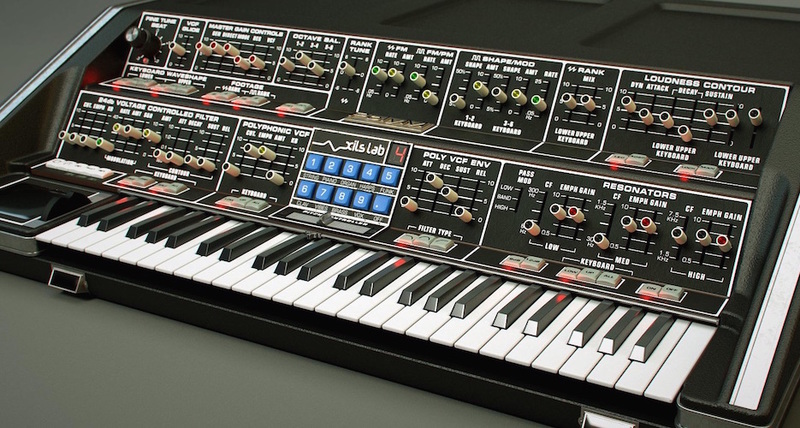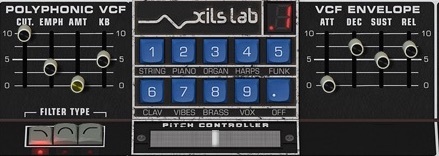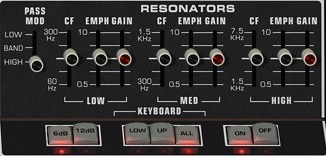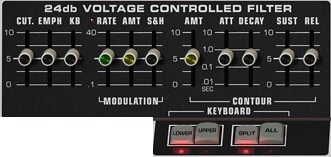- top rated
Unique Features, Unique Sound
The T.O.D Oscillators 'Pleasure Principle'
A few factors determined the iconic sound of the PolyM glorious ancestor: Two T.O.D Oscillators (Top Octave dividers), with PER NOTE Pulse Width Modulation, initially used to get a big polyphony (at this time). A gritty Moog-designed 24db Ladder Filter. An acoustic Filter Bank. And, finally, a character full Resonator Bank.
To take up the emulation gauntlet, more than two years were necessary to closely, patiently model these 71 components to finally come up with the best and most versatile Divided-down synthesiser ever done
Because XILS Lab not only exposed some parameters that were not accessible on the original machine, allowing you to dive into the machinery and mod it without a screwdriver, a soldering iron, and electronic components.
XILS Lab has also added a more traditional analog VCA ADSR, a plethora of LFO to modulate almost everything, and a trio of vintage-sounding effects among others things.
Using divide-down technology offers a particular sound for Chords, Strings, and Pads you won't find in any other synthesiser.
With this unit, feeding a monophonic zero-delay 24db self-oscillating filter, retriggered by keyboard strokes, gives you the possibility to play huge sounds in a way no other synthesiser can (PolyPedal behaviour emulated). Original presets, like 'Vox Humana', are also on board.
What's new in V1.5?
- GUI - More sizes.
- OSX - Apple M1 compatibility.
- VST3 plug-in.
- New Arppegiator with extended modulation.
- New Factory presets from Zensound (Adrian Jimenez), Daniel Stawczyk, Adam Borseti.
- Easy global A3 tuning (440hz, 432hz, anything else).
- Easy Octave change.
Top Octave Divider Oscillators
A technology first invented for organ synthesisers then adapted in more versatile synthesisers back in the '70s. In this technology, a high-frequency oscillator is divided into 12 temperated scale intervals for producing a full octave, which is then divided by a multiple of 2 for creating several octaves. This means that all the notes are locked to a single oscillator and then always played with the same relative phase. This produces a particular sound aside from giving a wide polyphony.
The PolyM reproduces finely this divide-down technology which has been pushed far by adding a polyphonic Pulse Width Modulation.
The two top octave dividers oscillators can run independently in the FREE mode, for small or huge phasing effects. On the other hand, in the LOCK mode, the two oscillators are almost locked in phase, producing a phase modulation, instead of a frequency modulation when the square wave form is modulated in pitch.
The two T.O.D oscillators can be modulated in pitch by an LFO (tempo sync-able) and the Square oscillator has its pulse width modulated by an LFO (tempo sync-able too).
The Keyboard is divided into two parts, Lower and Upper, and for each part, the PWM, waveform mix, and envelope decay can be tweaked independently.
The Master Gain control allows you to easily listen to various parts of the sound, DIRECT oscillator mixers output, through the MODE acoustic filters, through the RESonator filter bank, or through the 24db VCF filter.
The envelope has two modes, LEGacy or ADSR. In the first case, the envelope has been designed to match as close as possible its model and in the other case, it's a standard ADSR (Attack, Decay, Sustain, Release) envelope generator.
Each note has its own 12db filter, modulated by its own ADSR envelope giving the PolyM much more possibility than a simple Organ like synthesiser, much more than its model which modulated its filter only with the VCA envelope.
Moreover, The PolyM can change the filter type from Low Pass to High Pass and Band Pass.
MODE Acoustic Filters and Presets
The blue buttons are selecting the Acoustic filter ran in the MODE filter bank section. They can also load the PolyM with the original settings for producing specific sounds (Strings, Piano, Organ, Harps, Funk, Clav, Vibes, Brass, Vox). When the DOT button is engaged, only the MODE filter is changed.
The Resonators filter bank features three parametric filters for which Frequency, Level or Resonance can be adjusted. These filters can be Low Pass, Band Pass, or High Pass, 6db or 12db.
The VCF Section (Voltage Controlled Filter) is a 24db self-oscillating ladder filter, created from the XILS-Lab Zero-Delay Algorithm. It can be modulated by an LFO (sine, sample, and hold) as well as an independent envelope, controlled by the keyboard in a monophonic way.
And finally, In the Advance Settings Panel, you will find 9 Modulation slots, Delay, Phaser, and Reverb settings.
Everything to push the PolyM sound possibilities far away from its model, but keeping the pleasure characteristic.
Features:
- Two aliasing-free Top Octave Divider oscillators: One for the Sawtooth, the other for the Square.
- 71 emulated chips offering Mixer, VCA, envelope, 12db filter, and Pulse Width Modulation for each of the available notes.
- Gorgeous 24db ladder filter, using the acclaimed XILS-lab zero-delay algorithm.
- 9 dedicated acoustic filters (Strings, Piano, Organ, Harps) were carefully reproduced from the original model.
- 1 resonator filter bank using 3 parametric filters (6 and 12db) matching the original model.
- Four Vintage effects (Delay, Phaser, Reverb, and Chorus)
- 9 modulation slots for endless sound possibilities.
- 1 monophonic envelope
- 3 monophonic, tempo sync-able, LFO
- All parameters are MIDI controllable
- More than 440 presets
System Requirements
Mac OS X:
- Mac OSX 10.9 and later. (Apple M1 Compatible)
- VST2.4, VST3, Audio Unit, AAX Native (64-bit only)
Windows:
- Windows 7, 8, and 10.
- VST2.4, VST3, AAX Native (32 & 64 bit)
Please Note: PolyM is not a stand-alone application and requires a VST/AU/AAX compatible host application to function correctly.
Any references to any brands on this site/page, including reference to brands and instruments, are provided for description purposes only. For example references to instrument brands are provided to describe the sound of the instrument and/or the instrument used in the sample. Plugin Boutique do not have (nor do they claim) any association with or endorsement by these brands. Any goodwill attached to those brands rest with the brand owner. Plugin Boutique or its Suppliers do not accept any liability in relation to the content of the product or the accuracy of the description. "RHODES" is a registered trademark of Joseph A Brandstetter.





